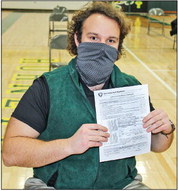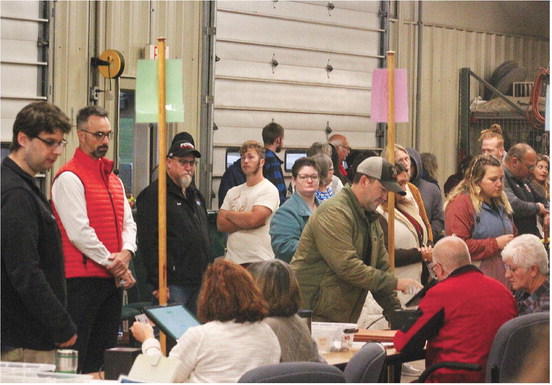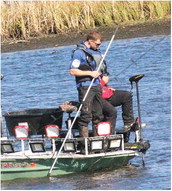Abby, Colby educators get first dose of COVID vaccine
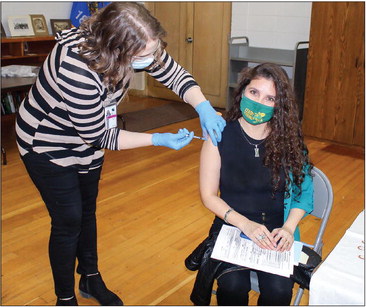

Relief. Peace of mind. A sense of gratitude. History in the making.
These were just a few of the words teachers and staff at the Abbotsford and Colby school districts used to describe their feelings after receiving the first dose of the COVID-19 vaccine last week.
“It’s history making. I’m going to read it in a book someday. . . . so we might as well be part of it,” Colby staff member Deb Roth said after she received her first dose of the Moderna vaccine.
Roughly 170 doses of the vaccine were administered between the two districts by Clark County health officials on Wednesday, March 1, and the emotions among local educators was palpable.
“You have that peace of mind of knowing you are going to be OK, and knowing that we’re beating this virus and getting back into a more normal lifestyle that we are all hoping so much for,” said Jessica Bohl, Colby’s ELL director.
A sense of relief and peace of mind were arguably the two most common themes running through teachers and staff at the March 3 event. Many said they don’t have nearly as many reservations about teaching now that they have had their first dose.
“I’m really just looking forward to the population being back...families, parents and our staff just feeling comfortable coming back to school safe,” said Melissa McConnell, virtual learning coordinator for the Colby School District. “That’s all we want for our kids.”
In the past 12 months, the novel coronavirus has swept through the world, killing over 2.5 million, including 525,000 here in the United States. Over half a million Wisconsin residents have been infected with COVID-19, and while nearly 98 percent have recovered, concerns regarding the virus remain high.
“It’s something that’s always in the back of my mind,” said Abbotsford maintenance supervisor Mason Rachu, sharing his thoughts on the virus. “I know that I still have to carry on day to day, but this is just one more thing where I can do my part [to help].”
The Pfizer and Moderna vaccines became available late last year, and were first distributed amongst the elderly and frontline healthcare workers such as doctors and nurses. Wisconsin has been leading the way in the Midwest with vaccinations, administering over 1.7 million of the 1.9 million allocated doses.
Almost 62 percent of Wisconsinites age 65 and up have received at least one dose of the vaccine so far. Meanwhile, others have had to wait patiently and anxiously for their turn.
But teachers across Wisconsin need not wait much longer after they became eligible for the COVID-19 vaccines at the beginning of this month.
The Clark County Health Department has been working closely with school districts ever since the start the pandemic, said health director Brittany Mews.
“We’ve been collaborating with our school districts since the start of the COVID- 19 pandemic,” Mews said. “We were allotted the doses that we were needing to vaccinate our Clark County school districts. We’re happy to be here today at Colby School District vaccinating our educators.”
Mews said the vaccination process on March 3 went “really well” and that the vaccine offers another step in mitigating the virus’s spread. “What public health is about is prevention,” she said. “So we’re really happy to be a piece of the prevention.”
With that being said, Mews said it’s imperative that others continue to follow health and CDC guidelines until they complete their vaccinations.
“Aftervaccinationwewanteveryoneto continue following all the recommended precautions of social distancing, masking, hand hygiene, avoiding large gatherings and continue to do those things even after vaccination is completed,” she said.
Even as one group rejoiced at receiving their vaccination, the push to vaccinate has been met with resistance. Anti-vaxxers and a wary public have hesitated to receive an injection from something that has been developed so rapidly.
For comparison’s sake, the fastest vaccine prior to the COVID-19 vaccines was for measels in 1980. That vaccine took four years to complete.
But science has advanced in leaps and bounds in the past 40 years.
Kris Woik, a teacher at Colby Elementary, noted that there was a great deal of hesitancy surrounding the polio vaccine when it was first introduced to the public some 60 years ago.
“I’m very thankful that we have a vaccine. I’m not scared that it was developed quickly,” she said. “I think that’s what we rely on science for. You have to make your own decision, but I thought right out of the gate on this one, somebody had to be the first to get the polio shot.”
Other teachers encouraged their communities to get the shot when it becomes available to the larger public. Not only will it cut down on quarantines, says Colby High history teacher Mike Sazama, it will help get things back on track.
“I think that getting the vaccine will give people peace of mind that we are doing everything we can to stop the spread,” he said. “It’s something we can all get through working together. If we stick together, keep practicing proper safety techniques, get outside and be active, it will help us all get through this thing.”
Most said that getting the vaccine will ultimately be a personal decision, and while there are concerns over side effects and long term effects, most agreed the potential for good outweighed any negative consequences.
“I would recommend people doing it, because just the other day I heard the father of one of my son’s co-workers had passed because of COVID,” said Colby High secretary Patti Rau. “It’s still out there. One sick day seems like a small price to pay to save someone’s life.”
The second dose of the vaccine will be administered on March 31, and while more side effects are possible, those who got their first vaccine have no problems coming in for their second shot.
“It’s worth being sick for a day,” Roth said. “If there are some side effects with it, it’s more than worth it to me if that means I can go into the community, or I can do something again that I couldn’t before, then I think it’s worth it.”
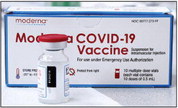
IT’S OFFICIAL -Mike Sazama displays his proof of vaccination after he received his first dose of the COVID- 19 vaccine. Teachers will receive a second dose at the end of this month.STAFF PHOTO/ROSS PATTERMANN
